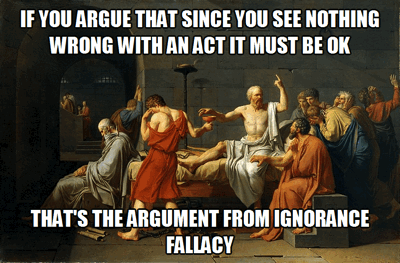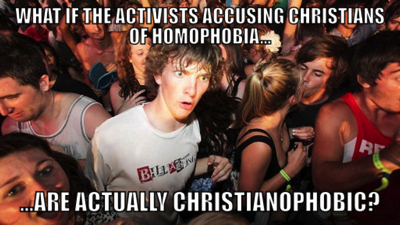The article, "Lewistown couple remains in limbo with Catholic Church,” reflects the advocacy journalism common today. We get the appeal to pity in favor of the position supported, and zero mention of why the Church acts as she does. The result of such advocacy journalism is to pit the “poor persecuted couple” against the “cold legalistic church."
But the problem is this: The Church believes that God condemns homosexual acts, and her role is to help people who are struggling in sin to return to God’s grace. The couple in question publicly rejected the Church teaching about homosexual acts by having a same sex “marriage” performed. Given the choice between loving and obeying God or remaining in their relationship, the couple chose the second option. Thus the Church had no choice but to deny them the Eucharist.
John 14:15 records that Jesus said, “If you love me, you will keep my commandments.” In Luke 16:10, Jesus teaches, "The person who is trustworthy in very small matters is also trustworthy in great ones; and the person who is dishonest in very small matters is also dishonest in great ones.” Finally, in Luke 10:16, speaking of the authority of the Apostles, Jesus says, "Whoever listens to you listens to me. Whoever rejects you rejects me. And whoever rejects me rejects the one who sent me.”
The point is, rejecting the teaching authority of the Church is rejecting Christ—no matter how people might wish it otherwise.
So, the couple and the author of the article plays the tactic of “divide and conquer.” They try to divide the pastor in question from the bishop ("What’s odd to me is the censure comes from Father Spiering at St. Leo’s, but the bishop hasn’t acted on it, he hasn’t changed it”), and the teaching from the Church (pointing to the statements of a German and French bishop).
The article portrays the couple as waiting it out, expecting the Church to change. But she won’t change from saying “X is a sin” to saying “X is not a sin.” All she might do is change the focus on how to reach out to sinners with the intention of bringing them back to the Church. Truth never changes, but the ways one reaches out to the one denying truth might change, so long as it doesn’t forget the truth. GK Chesterton once wrote:
An imbecile habit has arisen in modern controversy of saying that such and such a creed can be held in one age but cannot be held in another. Some dogma, we are told, was credible in the twelfth century, but is not credible in the twentieth. You might as well say that a certain philosophy can be believed on Mondays, but cannot be believed on Tuesdays. You might as well say of a view of the cosmos that it was suitable to half-past three, but not suitable to half-past four. What a man can believe depends upon his philosophy, not upon the clock or the century. (Orthodoxy pp. 135-36)
It’s a good point. God, being all powerful, all knowing and perfectly good, as well as being outside of time, does not change His mind about what is good and evil. He has, in the early days of bringing his plan of salvation to the whole world, gradually brought about prohibitions on what could be done in preparation for the fullness of revelation (the term is Divine Accommodation). But He has never gone from saying “X is evil” to saying “X is permissible."
Unfortunately, some people do think that because the believers in God moderated their positions on war, slavery etc, it means that the position on homosexuality must also change. But that is to miss the point. The shocking accounts of the Jews in gaining their homeland was not to say that it was once all right to commit genocide but not longer. The issue was the horrific practices of the people living in the region and God exacting His punishment, and removing such practices from the land:
4 After the Lord, your God, has driven them out of your way, do not say in your heart, “It is because of my justice the Lord has brought me in to possess this land, and because of the wickedness of these nations the Lord is dispossessing them before me.”* 5 No, it is not because of your justice or the integrity of your heart that you are going in to take possession of their land; but it is because of their wickedness that the Lord, your God, is dispossessing these nations before you and in order to fulfill the promise he made on oath to your ancestors, Abraham, Isaac, and Jacob. 6 Know this, therefore: it is not because of your justice that the Lord, your God, is giving you this good land to possess, for you are a stiff-necked people. (Deuteronomy 9:4-6)
Idolatry and child sacrifice were wrong in those days and are wrong now. The difference between then and now is that then God was restricting the behavior of warlike tribes that would otherwise have done worse, and He continued to restrict them in bringing them closer to His plan of salvation.
Jesus did not release moral prohibitions. He made them stricter:
Teaching About the Law. 17 *“Do not think that I have come to abolish the law or the prophets. I have come not to abolish but to fulfill. 18 Amen, I say to you, until heaven and earth pass away, not the smallest letter or the smallest part of a letter will pass from the law, until all things have taken place. 19 Therefore, whoever breaks one of the least of these commandments and teaches others to do so will be called least in the kingdom of heaven. But whoever obeys and teaches these commandments will be called greatest in the kingdom of heaven.* 20 I tell you, unless your righteousness surpasses that of the scribes and Pharisees, you will not enter into the kingdom of heaven.
Teaching About Anger.* 21 “You have heard that it was said to your ancestors, ‘You shall not kill; and whoever kills will be liable to judgment.’* 22 *But I say to you, whoever is angry* with his brother will be liable to judgment, and whoever says to his brother, ‘Raqa,’ will be answerable to the Sanhedrin, and whoever says, ‘You fool,’ will be liable to fiery Gehenna. 23 Therefore, if you bring your gift to the altar, and there recall that your brother has anything against you, 24 leave your gift there at the altar, go first and be reconciled with your brother, and then come and offer your gift. 25 Settle with your opponent quickly while on the way to court with him. Otherwise your opponent will hand you over to the judge, and the judge will hand you over to the guard, and you will be thrown into prison. 26 Amen, I say to you, you will not be released until you have paid the last penny.
Teaching About Adultery. 27 *“You have heard that it was said, ‘You shall not commit adultery.’ 28 But I say to you, everyone who looks at a woman with lust has already committed adultery with her in his heart. 29 *If your right eye causes you to sin, tear it out and throw it away. It is better for you to lose one of your members than to have your whole body thrown into Gehenna. 30 And if your right hand causes you to sin, cut it off and throw it away. It is better for you to lose one of your members than to have your whole body go into Gehenna.
Teaching About Divorce. 31 *“It was also said, ‘Whoever divorces his wife must give her a bill of divorce.’ 32 But I say to you, whoever divorces his wife (unless the marriage is unlawful) causes her to commit adultery, and whoever marries a divorced woman commits adultery.
Teaching About Oaths. 33 * “Again you have heard that it was said to your ancestors, ‘Do not take a false oath, but make good to the Lord all that you vow.’ 34 But I say to you, do not swear at all;* not by heaven, for it is God’s throne; 35 nor by the earth, for it is his footstool; nor by Jerusalem, for it is the city of the great King. 36 Do not swear by your head, for you cannot make a single hair white or black. 37 *Let your ‘Yes’ mean ‘Yes,’ and your ‘No’ mean ‘No.’ Anything more is from the evil one.
Teaching About Retaliation. 38 *“You have heard that it was said, ‘An eye for an eye and a tooth for a tooth.’ 39 But I say to you, offer no resistance to one who is evil. When someone strikes you on [your] right cheek, turn the other one to him as well. 40 If anyone wants to go to law with you over your tunic, hand him your cloak as well. 41 Should anyone press you into service for one mile,* go with him for two miles. 42 Give to the one who asks of you, and do not turn your back on one who wants to borrow.
Love of Enemies.* 43 “You have heard that it was said, ‘You shall love your neighbor and hate your enemy.’ 44 But I say to you, love your enemies, and pray for those who persecute you, 45 that you may be children of your heavenly Father, for he makes his sun rise on the bad and the good, and causes rain to fall on the just and the unjust. 46 For if you love those who love you, what recompense will you have? Do not the tax collectors* do the same? 47 And if you greet your brothers only, what is unusual about that? Do not the pagans do the same?* 48 So be perfect,* just as your heavenly Father is perfect. (Matthew 5:17-48)
In every single case, Jesus showed that the teaching of the Old Testament was not reversed. It was expanded to be more binding— not just avoiding the acts of murder or adultery, but rejecting the cause of those acts.
The Apostles did not believe they had the right to overturn the teaching of God, and so they never committed the argument from silence fallacy that modern critics do in trying to separate Jesus from St. Paul or the Old Testament when it comes to the condemnation of homosexual acts because they mentioned these acts while Jesus did not—ignoring the fact that Jesus defined what marriage was in a way that excluded their attempts to divide:
4 * He said in reply, “Have you not read that from the beginning the Creator ‘made them male and female’ 5 and said, ‘For this reason a man shall leave his father and mother and be joined to his wife, and the two shall become one flesh’? 6 So they are no longer two, but one flesh. Therefore, what God has joined together, no human being must separate.” (Matthew 19:4-6)
You can’t separate God from Jesus. You can’t separate Jesus from His Apostles. You can’t separate the Apostles from the Church today. You can’t separate the Church teaching from the Pope and the Bishops or the Bishop from the Priest who is carrying out his assignment. While you get some in the Church who want to change what the Church believes God has commanded, those people are not the Pope or the bishops in communion with him, but people who put their opinions above the teaching of Christ.
People who do this may be willfully in defiance or they may be acting out of ignorance—THAT’S where Christ’s words of not judging apply—so we can’t write them off as irredeemable. We have to continue to reach out to them, helping them to understand when actions separate them from God’s love, helping them to come back.
That’s what the Pope is calling for—not changing “X is a sin” to “X is not a sin."





